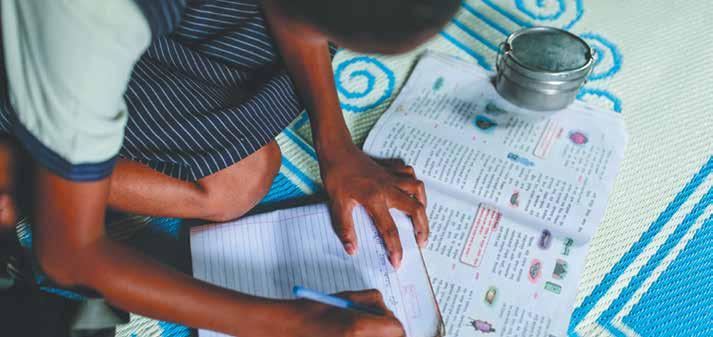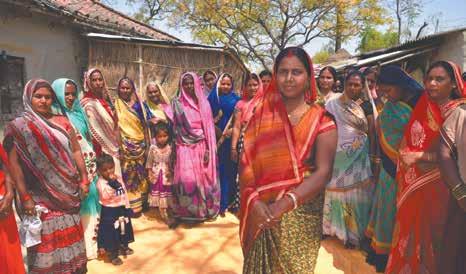
5 minute read
NEWS IN BRIEF
EDUCATION
Education providers across the globe continue to face challenges due to remote learning, access to internet and devices, along with keeping students enrolled and engaged during lockdowns and economic downturns.
In Pakistan alone, 10,000 of the 207,000 affordable non-state schools have permanently closed due to impacts from COVID-19. With a second wave well underway, schools have closed in-person classes again, which could lead to another 15,000+ closures. In response to concerns regarding the effects of closures and lockdowns on sponsored schools, Opportunity International’s EduFinance program undertook a COVID-19 impact assessment, surveying 1,802 clients including parents, educators and school proprietors such as
As schools begin to re-open, program partners are working to ensure girls go back to school. © Sara Bolst owners or principals. The study showed that 83 per cent of parents’ who owned self-managed businesses had completely shut down, with only 36 per cent having access to small amounts of savings, most of which had already been used. By September of 2020, about a quarter of parents reported that they were unable to provide essential food products like fruit and milk for their families due to costs. For educators and school proprietors, job losses and lost hours have led to 75 per cent of teachers using personal savings to survive, with 52 per cent expressing concerns that they would not be able to afford to continue their own children’s education. The primary concern of school proprietors has been the sustainability of their school, due to fee payments halting while costs of operation continue. A key factor in keeping schools open, and families able to keep their children enrolled, is access to capital through small loans. EduFinance continues to expand their program, facilitating the provision pf small interest loans to both schools and families across Asia, and the globe, to cover costs during lockdowns and offer flexible repayment schedules. The impact assessment survey also revealed that 94% parents of boys said they would send their sons back to schools upon reopening, but only 31% of parents said they would re-enrol their daughters. This only furthers the need for greater access and support for entire families during this time. With your support, Opportunity can ensure more girls return to school, and that schools remain open with remote and online learning capacity.
HEALTH
Vaccine rollouts continue across Asia, with India facing unique challenges as the government seeks to vaccinate over a billion people.
Despite impressive vaccination numbers across India and greater Asia, there is still already restricted access to regional areas due to adverse weather conditions, local travel restrictions, and sparse infrastructure which makes transporting a vaccine extremely difficult. Supported by the World Health Organisation, COVID-19 testing in Indonesia has ramped up, revealing a concerning number of cases that would otherwise remain undiagnosed. Testing led to the highest number of cases on 30 January at 14,518 people returning a positive test. Our program partners are continuing to support clients with telehealth services for those who may be isolating or otherwise unable to access traditional healthcare, and support health leaders through online training.

Health leaders are continuing to fill the gap where traditional providers may not. © Matthew Smeal
MICROFINANCE
During the peak of the pandemic, loan moratoriums and rescheduled payments assisted our clients in maintaining their small businesses.
As many countries move into a ‘recovery’ phase these measures have been extended to promote the continued financial inclusion and economic empowerment of clients, mostly women.
Program partners continue to offer flexible repayment schedules © Sarah Gray
SAFETY

Counsellors and legal advocates are finding consistently high demand for safety services even as lockdowns ease.
COVID-19 revealed a concerning jump in reported cases of domestic violence, but through Operation PeaceMaker, women and their families are still able to access the resources they need in-person. The Lotus Safe Home is providing much needed housing for women and children who have fled their homes. A 2020 Human Rights Watch report shows that despite legal reforms, there is still a long way to go for victim-survivors of domestic violence and abuse to seek justice. Across India many women work in informal settings as domestic workers, cleaners and ‘informal help,’ leaving them vulnerable to exploitation. The 2013 Sexual Harassment of Women at Workplace (Prevention, Prohibition, and Redressal) Act sought to address the risks by requiring districts to establish local committees to deal with sexual harassment and assault cases but this has brought little change. Operation Red Alert, in partnership with Safe Village Programs also led by the My Choices Foundation, has continued training programs to prevent exploitation with plans to expand their services as COVID restrictions ease.

As a business owner maintains their cashflow thanks to those moratoriums, they are able to contribute to local, regional, and national economic resilience and recovery. For our partners, however, restructuring client loans and repayments has caused cashflow strain. This has included debt rescheduling with pauses sufficient to allow recovery, capitalisation of interest in arrears, and in some cases, reduction of interest rates on the rescheduled debt. Indonesian program partner, TLM, has been hit particularly hard by COVID-19 but have remained resilient despite the challenges. The January earthquake in Sulawesi led TLM to form a skeleton staff, relocating the Mamuju team after the office was badly damaged. To support clients also in the earthquake affected area, a moratorium has been placed on loans for all clients in the Mamuju region as they rebuild. On top of this, approximately half the staff have contracted and are recovering from COVID-19 but are at risk as infection numbers in Indonesia remain high. TLM has successfully assisted clients in moving towards weekly repayments, offering additional loans to restimulate affected businesses. Your support is greatly appreciated as the TLM team rebuilds and recovers after this difficult period.
One in three women in India will experience domestic and family violence, but local PeaceMakers are working with My Choices Foundation to help women find safety. © Matthew Smeal






